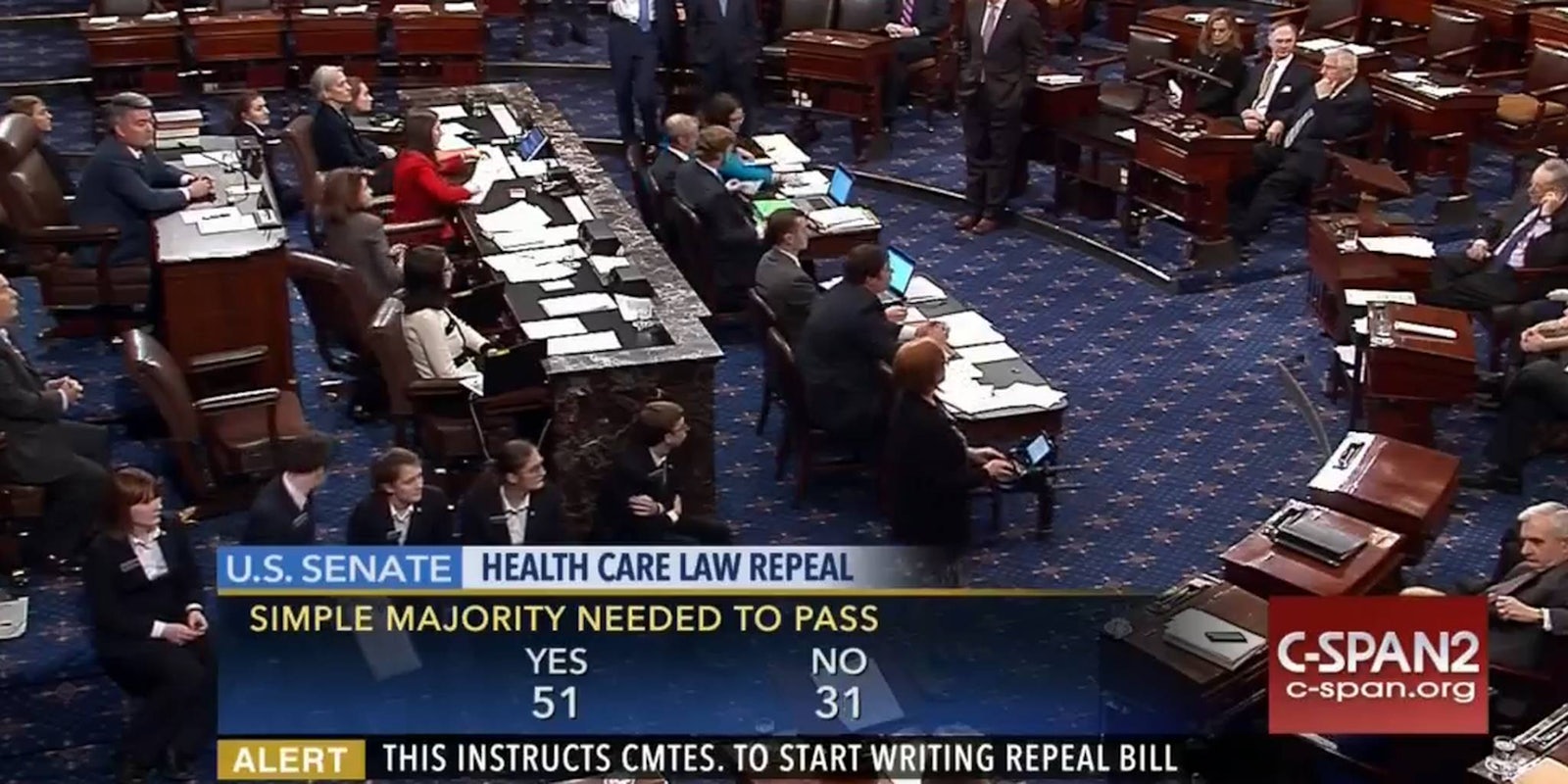The Senate on Thursday adopted a budget resolution that would move Congress closer to repealing Obamacare. But you were probably asleep when it happened.
In a drama-filled, late-night “vote-a-rama” voting session that lasted nearly seven hours, the Senate voted 51 to 48 to approve a budget blueprint for fiscal 2017 that would instruct committees to come up with a plan to repeal the Affordable Care Act, better known as Obamacare.
This would require Republicans to immediately create a plan to replace Obamacare with a new law, or face the prospect of an estimated 30 million people losing their healthcare.
“This resolution will set the stage for true legislative relief from Obamacare that Americans have long demanded while ensuring a stable transition,” Senate Budget Chairman Mike Enzi (R-Wyo.) said just after 1am ET on Thursday. “The Obamacare bridge is collapsing and we’re sending in a rescue team.”
It’s important to note that Thursday’s vote was not a repeal of Obamacare—that would require a separate piece of legislation. Since budget resolutions are prohibited from containing policy, Congress would have to take up a separate bill to repeal the Affordable Care Act itself.
There is significant dismantling of the 2010 healthcare law that Congress can accomplish through budget reconciliation, such as repealing the individual mandate, the medical device tax, premiums to insurance companies, and other crucial mechanisms that keep the law afloat. The Senate did not adopt any amendments to protect those aspects of the law on Thursday.
Republicans repeatedly said they would “repeal and replace” Obamacare simultaneously. Thursday morning’s vote was not the ideal scenario for some Republican lawmakers because they have yet to come to a consensus on an Obamacare replacement.
The Senate also blocked Democratic amendments that would protect well-liked parts of Obamacare, including: one that permits children under the age of 26 to stay on their parent’s health insurance plan, one that prohibits health insurance companies from refusing people with pre-existing conditions, and one that requires health insurance plans to cover contraceptive services for women.
Also on the chopping block: amendments that would have protected cuts to Medicaid, Medicare, and the Children’s Health Insurance Program. An amendment that would protect Medicaid funding for the 32 states that accepted the option of expanding that program under the Affordable Care Act was also blocked.
Because there is no replace I voted no on repeal. This is called repeal and run. Chaos is coming.
— Claire McCaskill (@clairecmc) January 12, 2017
Not a single Democrat voted for the legislation. In a rare move, every Democrat explained their “nay” vote at their desks.
“Because it is wrong to repeal and run, I vote no,” said Sen. Chris Van Hollen (D-Md.).
Others explained why the Affordable Care Act law was important to their states.
“On behalf of 50,000 native Delawareans who will lose healthcare, I vote no,” said Sen. Chris Coons (D-Del.)
“On behalf of all the children of New Mexico who gained healthcare coverage through the Medicaid expansion, I vote no,” said Sen. Martin Heinrich (D-N.M.).
“I think it’s important for this country to know this was not a usual thing, this is a day which lays the groundwork for 30 million people to be thrown off their health insurance,” Sen. Bernie Sanders (I-Vt.) said. “And if that happens, many of these people will die.”
The House is expected to quickly take up the Senate’s budget resolution on Friday.
If passed by the House, Congress will then have until Jan. 27 (instead of late March as some Republicans hoped) to replace Obamacare with a new health care law. Sen. Bob Corker (R-TN) who removed his amendment that would have pushed back the Jan. 27 deadline, called it a “placeholder”.”


